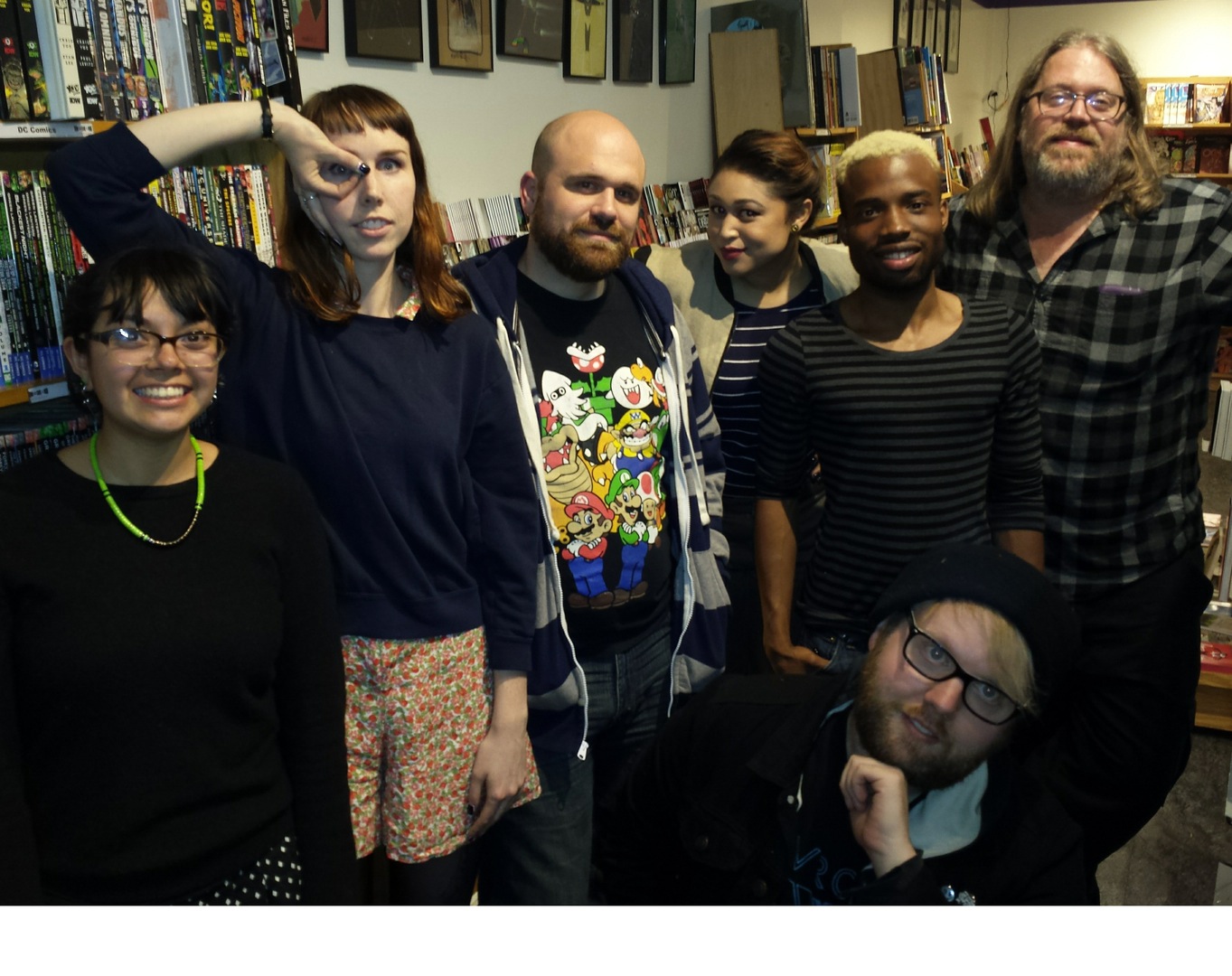
The other day we presented a story on long running SF comics shop Comix Experience and their plans to increase revenue in the face of the local rise in the minimum wage: a graphic novel book club that’s already had a positive response. It’s a serious issue for small business owners, and led to a lively comments section. I reached out to Hibbs to see if he had any comments on the comments and ever loquatious, he suggested an interview. The results can be read below.
Comis Experience has two locations, the iconic Divisidero St. shop just off Haight St. site of many famed signings by creators from Neil Gaiman to Warren Ellis and an early adapter of the grahpic novel movement; and a newer more superhero focused store on Ocean Ave. that Hibbs took over from a previous business last year. Hibbs has long been one of the most vocal comics retailers. His Tilting at Windmills column at CBR is must reading and the comics review blog he started Savage Critics is, unbelievably, still running after 10 years or so. I’m grateful for him to take the time to talk about issues that are sure to become more and more pressing around the country.
THE BEAT: In the Beat comments and a few other places you’ve gotten a lot of free advice on running a store in the Bay Area. Did you expect that when you announced this plan?
HIBBS: After seeing what happened to Alan Beatts of Borderlands Books after he told his story earlier this year, in the public comments sections of Facebook or mainstream news stories — people accusing him of being a monster or much worse — I was expecting a lot more advice from people without all of the facts! Welcome to the internet!
The thing is that these are flashpoint issues for a lot of people, with political under-currents that can’t really be ignored, and I totally get that, but I’m most interested in keeping my store moving into the future, and doing the best I possibly can by my wonderful staff.
THE BEAT: Just to make it as clear as possible when talking about something as personal as what people make for a living, the current minimum wage in California is $9 an hour. I believe you mentioned this in your own comment, but can you confirm that you currently pay your employees more than that? As I understand your comment, you would still have to raise wages in compliance with the new SF minimum wage hike?
HIBBS: Federal MW is $7.25, California is $9, San Francisco is (today this second) $11.05, and moves it to $12.25 in May (not July like I stupidly wrote in the original pitch), then to $13 on 7/1/16, $14 on 7/1/17 and $15 on 7/1/18.
I think it is also important for people to understand that San Francisco’s MW does not STOP at $15/hour after that — San Francisco has an older law that sets annual increases to the amount that the Consumer Price Index (tracked by the Federal government) in the Greater Bay Area rises. Historically, this is 2-3% a year. Therefore in 2019 it might be $15.45, $15.91 in 2020, $16.39 in 2021, and so on
But, anyway, at this second in time we’re obligated to pay $11.05/hour MW in San Francisco. However, we don’t pay MW, except for an initial three month training period. I have no employee currently that is making less than $11.25.
The thing is, as MW rises, so do we need to raise our pay — I’ve spent twenty-six years being a not-MW job (well, twenty-five, because I worked seven days a week in year one), and I don’t want to begin now. When MW is raised by $1.20/hour in May, I believe that means that the people I pay $11.25 today will need to make no less than $12.45 at that point, because, otherwise, are we not effectively CUTTING their pay? In the same way, I have to pay my managers more so that there’s, y’know, a financial benefit for being a manager, and they’re not making the same as “just” staff — and I can’t raise it less than the amount MW is raising by, otherwise, again, they’re effectively getting a cut.
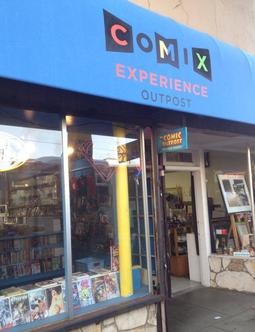
THE BEAT: Doing back of the envelope math, $80K comes to $220 a day, which is a pretty hefty added expense for any small business. That would equal selling 55 periodical comics a day more, to put it in perspective. Were there any other methods besides a book club that you considered to make up the shortfall?
HIBBS: Fifty-five $3.99 comics, but more like seventy-four that cost $2.99. And I can’t change those cover prices — we’d lose more customers than we would gain in revenue!
For people asking about the math, it works like this: I have roughly 190 employee hours each week between the two stores. We’re open 10 hours a day at each of the two stores, seven days a week, so you can see that’s really not a tremendous overlap of hours to get all of the labor done that simply can’t be done with only one person in the store who is expected to be, y’know, helping customers find the things they want (or discover things they don’t know they want yet!)
The difference between today’s MW and 2018 is $3.95 /hour. $3.95 times 190 hours times fifty-two weeks a year equals just over $39,000 then we have to add about another $3,000 for the matching taxes that all employers pay for Social Security and Medicare, so that’s $42,000 more that staff will cost. (not counting the new-this-year California mandated minimum Sick Days, either!)
However, in order to make forty-two thousand dollars, this means I have to sell roughly eighty-four thousand dollars worth of merchandise because the Cost of Goods Sold is (very roughly) half of the income — no one is keeping $3.99 from a $3.99 comic book!
I rounded down for ease of communication, but I probably just as easily could have rounded up to $90k because of the various overhead costs that have to be dealt with (shipping, primarily, but there are always other marginal costs that begin to add up quick)
But, yeah, $80k+ is a big hill to climb for a small business.
I do have a few other ways I can help close the gap — I can certainly reduce the number of hours the stores operates for one, though it would help less than you might think because, often, the stores are slowest in the MIDDLE of the day. Further, the great Jim Hanley told me something that always stuck in my mind: you should be open for the customers who are there, not the ones who are not. There are absolutely days that your biggest sale of the day comes at 10:05 AM or 7:55 PM, and you can’t be certain if that sale would still be there if your hours weren’t convenient for the customer.

So, yeah, I could reduce hours of operation, or I could cut staff overlap to be even tighter (though, it’s hard to see how the physical work of the store doesn’t start to slip some in that case), to work that much harder for the pay. I have that choice. There’s not a lot of other places that expenses can be cut, though — we run extremely lean on inventory, and we’ve got robust mechanisms for getting rid of excess stock that work pretty well; and we always do as much cost-pruning as we can for ongoing expenses — just as a dumb example: we’ve used high efficiency light bulbs for years. Hell, I have DSL in the store, rather than cable so that I can save the ~$60/month that entails. No, staffing the stores is, in fact, the single biggest expense each month, higher than rent and every utility and service combined.
And, while I would fire people if that’s what it absolutely positively took to keep the doors open, it is my fervent belief that bookstores that try to cheap their way out of cash-flow problems almost always enter the death-spiral at that point because customers can smell the stench of failure.
What I’d really much rather do, any day of the week, is grow the business enough to pay for this new mandate.
THE BEAT: People in the comments seem to think that owning a smallish comics shop, let alone two smallish comics shops, in the Bay Area with its insane cost of living rise in recent years is a doomed enterprise. How worried are you about the general prognosis for a small business in Google/Apple City, USA?
HIBBS: Don’t forget Twitter and Airbnb and Uber and Yelp too! Plus, The City gives tech firms millions of dollars of tax breaks, and basically pays nothing but lip service to small businesses.
Look: the comic shop that sold (I’ve been told) the largest number of periodical comics in San Francisco, Jeffrey’s Toys on Market street, just a few blocks from all of those tech offices downtown, was just forced out by their landlord who demanded that their rent raised from eight thousand dollars a month to forty thousand! A five-fold increase!
Who on earth can pay forty grand a month each and every month for retail space? A super-high-end restaurant like a Gary Danko or something…. maybe? San Francisco is littered with empty retail store fronts right now because commercial rents have gone nuts, and everyone is trying to get their piece. Just this month two different businesses (Michael’s Pit Stop, a bodega and keymaker, and the KK Cafe, which was a great little cafe where this wonderful couple, Jack and Margret, also made their own peanut milk) within a block of us have been kicked out of their space due to unbearable rent increases.
It is something I worry about each and every day. The main store has been month-to-month for twenty-one years now, my landlord has always refused my offers of a new lease, but they’ve also always been extremely generous about how they handle rent increases. I might have had a crisis long before now except for that. But I could be kicked out at any time with essentially no warning, or have my rent tripled, or whatever, and there’s no recourse.
Look: when I opened in 1989, we had twenty-four comic stores in town, and now we are down to just eight. Two of which are mine. I don’t like that.
Hell, we are probably the only major United States city that doesn’t have a single national-chain bookstore because the economics of bookselling are really hard in a city this expensive.
More generally, though, I do think that the climate for small business in San Francisco, especially small business based around art or creativity, is rough and getting rougher. I certainly expect that between rising rents and this new minimum wage mandate, business like mine which are currently profitable, but only by so much, are going to continue to be pressured over the next few years as the costs associated rise. All we can do is try to plan ahead for the things we can know about, which is really why I am trying to do the Graphic Novel Club.
I really think there’s a value and a need in a curated graphic novel program, because I really and truly think that there are a lot of people who would adore the output of the market…. if only they were aware of all of the choices they have. Comics rule pop culture, but there’s no one really saying “Here, civilian, here is a thing you should read each month”.
I have to think that almost everyone reading this could think of at least one friend or relative who might enjoy the program, and I super encourage folks to spread the word.
Are we “doomed” though? Well, hell no — I could always go back to just having one store and firing most of the staff and running it myself five days a week again; and given that fallback, it’s difficult for me to see almost any outside force making the store close. But, Heidi, that would be such a step backwards, and I’m trying with bold optimism, to move things forward.
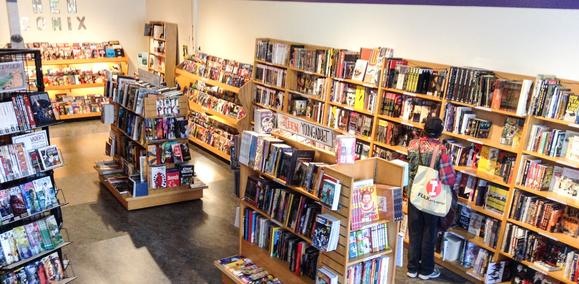
THE BEAT: Are there any other steps you are taking to deal with the rising cost of living in the Bay Area?
HIBBS: Well, all you can do is try to diversify your store and your customer base and try to appeal to as many people as broadly as possible to help spread the words that comics are awesome. We’re now holding regular ladies nights to try to attract new women to the store (We had one on Ocean last night, and our next one on Divisadero is May 6th), and we’ve started a regular series of weekly videos for the new store to communicate their energy. We want for the original store to do a slightly more cerebral video series at some point — but, whew, only so many hours in the day to shoot and edit such things.
We’re about to start experimenting with doing children’s weekend mornings, with drawing classes and such, too — but ideas are easy; it’s execution and manpower and pulling off community and events without spending too much to implement the ideas that is the trick. Give me an infinite budget, and I bet I could do some amazing things — but the problem isthat budget (and the amount of hours available to DO promotion) and that it is always a limited thing that has to be worked in and around the normal day-to-day servicing of customers and keeping the store running, physically.
THE BEAT: As also mentioned in the comments, the theory behind the wage hike is a form of “trickle down” economics. Do you think it could eventually raise your customer base in some way?
HIBBS: Yeah, well, I have to say, living in a city where we’ve had raising minimum wage every year for the last eleven (well, wait, it didn’t raise in 2010, it looks like), I can not say that I can detect any kind of a correlation between a rising MW and rising revenue. Now, whether that is a result of cost-of-living rising faster than wages, or a result of something particular and specific about the relationship that comics fans and their buying habits share, or whether it is something that I am doing right or wrong, or whether it just has to do with the fact that human beings are messy, illogical beings that operate differently than “well, that sounds like a reasonable theory” would otherwise suggest, I just can’t say. But I am just not seeing any correlation in my sales.
Let me say, kind of as forthrightly as I possibly can, I am not an economist. I don’t actually understand a lot of the theorycraft behind it (though I try), but I do have 26 years as a business owner in a “realpolitik” way of watching my individual micro-economy, and I really think that any kind of “trickle down” is pretty much hooey for a business like mine. People, by and large, determine their budget for comics pretty independently of their specific income. I know plenty of plenty of people who are already spending above their means, and plenty who could pay five times more, but are super-picky, and every case study in-between.
Further, if I understand the various studies that I’ve read correctly, and I absolutely may not be, most studies are reporting on the macro, not the micro — they don’t give a shit about an individual person or entity as long as the overall picture shows a particular result. That’s reasonable of course, but my major concern is for for my staff and my store. I don’t want to be on the wrong side of that ledger. I don’t want to have to fire people, therefore making their new minimum wage zero dollars per hour!
If I understand the studies I’ve read, and, again, I really may not have understood them well at all, they generally show a “neutral” or “slightly improved” impact of small (25 to 50 cent per hour) MW changes. But within any survey there of course will be winners and losers from any kind of economic shift — it’s great that the economy as a whole is “neutral”, but that doesn’t help you if your own personal economy is “laid off” or “have to shut your business”.
Further, it is my understanding (again again again maybe totally wrong) that no credible economist can accurately predict what a raise in MW of this scale will do, because there’s absolutely no evidence since there’s never been a raise on this scale. It is going up 43% over three years, by $3.95 — that is literally unprecedented.
What I think is going to happen is either that more workers will become MW workers, or will get closer to being MW workers, because I have a hard time seeing every San Francisco based business giving each and every employee a $3.95 raise over the next three years, and / or common everyday transactions are going to have to go up as a result. You’ll pay fifty cents more for your coffee and a buck more for your burrito, and you’ll wonder why you seem to have no more money in your pocket at the end of the day.
One of my main frustrations with the law is that it is so arbitrarily, geographically. My minimum wage is going to be $15, but travel just a few minutes south to Daly City and it is only $11; even Marin to our north, which is historically filled with “rich people”, only maxes at $13. Within an half-hour drive, it is only $9.
But the real disconnect, for me, is that what is a “living wage”, and just how much individuals should be able to participate in decisions about their own compensation, and what that entails.
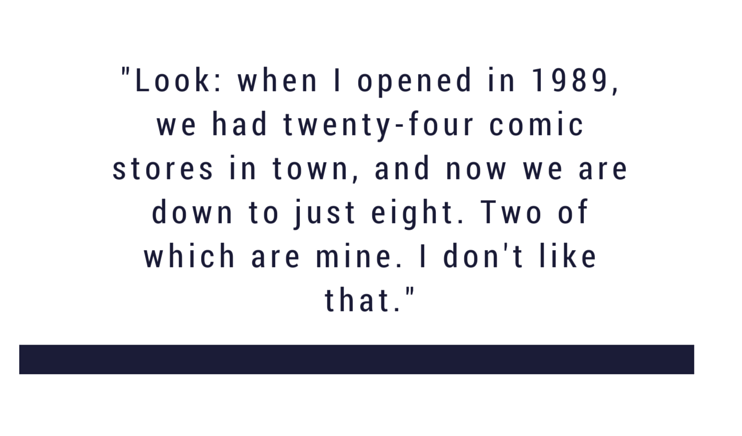
I have staff who live at home and are full-time students; I have staff who are fully supported by their significant other, and who work because they want to generate some pocket money while they work on their art careers. I have staff who purposefully quit better paying corporate jobs to work for me because they have more agency here. And I have staff (Pretty much each and every one of them, really!) who are awesome enough to probably make two or three or five times what I am paying them, but who would rather be here than the many other choices that they have.
Ultimately, I try to be about empowerment — one of my staff specifically told me during the job interview that her goal is to open her own comic book shop someday. Hell yeahs! I am so down with that notion — because certainly one of my proudest days ever was when Michael Drivas learned just enough from me to help him open Big Brain Comics in Minneapolis — but isn’t, I dunno, “learning at the feet of the master” (ew, bad metaphor!!!) worth some sort of credit against hourly wage? Man, I charge my consultancy clients $100/hour for what I say. I mean, I clearly believe that I owe her for her time, duh, but shouldn’t we calculate “value” past only dollars-per-hour?
My bottom line is that I absolutely want to pay people every penny that they are worth, but the hard realities of profit-and-loss sometimes make that harder for others — whether that you’re in a high-expense city, or a low-expense town, I’ve met exceedingly few comic store owners that don’t struggle every day to take care of business.
The more important thing to me is how you deal with that struggle, and I’m trying to find a path that allows my staff to get paid more while making sure that I don’t contract the business so that five of them lose their jobs as a result.
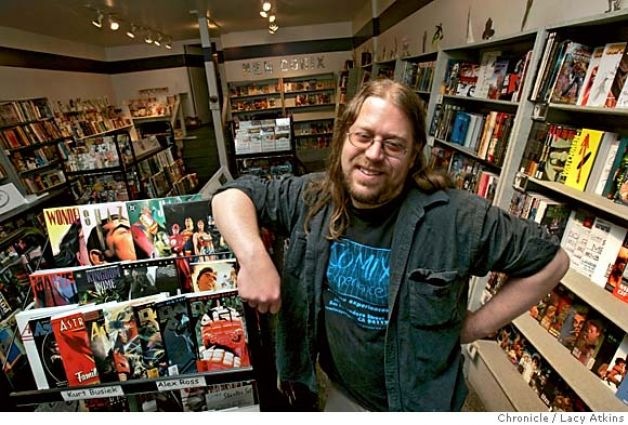
THE BEAT: Do you foresee the wage hike affecting other shops in the area?
HIBBS: So, my two physically closest competitors are “family operated”, and I don’t believe employ anyone who is getting paid any kind of “hourly wages”. Which is 100% fine, but that means they have a smaller “nut” than I do to breaking even. Three of the other four stores in town have at least one employee, and so will be impacted to at least that degree. No one else in San Francisco, at least as far as I know, has six employees and the payroll that I face, but I do know at least one other store who has a plan to deal with their own shortfall that I assume they will be announcing soon.
Other geek-friendly shops in the area, book stores, game stores, to the extent that they have employees, will have to come up with extra funds to take care of those costs.
I don’t know exactly how clearly other stores are looking at their own liabilities. Until I wrote Alan Beatts I hadn’t actually bothered to take out the pen and actually figure out what the bottom line impact was. Then I crapped my pants when I realized the scope of it.
Thankfully necessity is the mother of invention, because I think I have solid, entrepreneurial plan.
THE BEAT: Finally, how is the book club doing so far? Any surprises or new wrinkles in the huge amount of time (two days) it’s been live?
HIBBS: We’re closing on 72 hours since I first put it live (but I don’t think anyone noticed for most of the first day) and we’re allllmost at the 25%-funded mark, which I think is an absolutely fantastic response, even though that still gives us miles yet to go. I’m also strongly hoping that we can beat the goal by really large percentage so that all of my staff can get paid well above the $15 hour MW as they properly deserve.
My hope of your readership is, even if they don’t think this is for them, is that they’ll think of someone they know who it might be a good fit for, and they’ll make a point of turning their friends on to the idea — from my point of view right now where we’re at, a share is as good as a subscription. We’re fully set up to handle nationwide subs, and the social media connections we have planned, as well as the streaming and recorded book club meetings will be, we hope, the icing on an already fantastic cake of content. If you know anyone who could use a sherpa to guide them through the mountains of comics being published today, I think the Graphic Novel Club is for them.







the intellectual dishonesty of blaming a three year, phased minimum wage increase for the financial problems of a small, independently owned, razor-margin business in the most expensive city in the country is made that much more frustrating by the fact that he grazed a couple of legitimate points.
What was intellectually dishonest? You saying Hibbs’ math on his own business that he’s run successfully for years is wrong?
hey Dandy, what business do you run that you can go out and accuse a stand-up guy like Brian of intellectual dishonesty? And, where do you run that business?
A rising minimum wage is hardly the only challenge a SF based independant business faces, rising real estate costs are killing people everywhere too, amd not just in SF but in the entire bay area. Pretty soon there may not be a comic shop, music venue or art gallery ANYWHERE in the bay and every artist, musician or otherwise is going to be living in the central value waiting for the next bubble to burst.
Cities like San Jose and SF force crap like minimum wage raises down a small businesses throat while companies like Google or Facebook or Apple (or take your pick) routinely use “interns” to get around paying anybody anything. Brian’s point about cities giving tax breaks to huge companies while doing nothing for small business hit home too. When SLG was kicked out of its place three years ago the developer who bought the property was given a subsidy that in the end came to close to two million dollars. On top of that their building permits and other city paperwork were all fast tracked.
What did I get for my trouble and for my 12 years of being in that location. Squat. I can guarntee you that the developer building that new aprtment did not have to wait for fours hours to talk to someone in the planning department the way I did.
So, nice way of saying until you walk a mile in someone’s shoes, go blow.
Dandy: can you explain your position? I know most of us have little opportunity in our lives to post more than off the cuff vague statements, but your statement is weightless without elucidation. You might be right, but that won’t be recognized without convincing substantiation.
Mr. Hibbs, been in one of your stores before while travelling on business and thoroughly enjoyed it–and bought some comics! I talked comics with your staff member, not politics. However, I do have a degree in Economics. In the first intro macroeconomics class you take as a sophomore, one of the first concepts you’re introduced to is what happens when a “floor” wage is set above the market “equilibrium” wage. That is, a minimum wage is dictated. If that min wage is above the market equilibrium wage, one of the consequences is “surplus” employment, i.e. unemployment. You then learn this again in intermediate economics and then again in Labor economics. It’s very basic and it always works like the theory says it does. You describe yourself as a progressive but the irony here is that your progressive policies have done this to you and your employees. You’ve killed your business and that’s a shame–I liked your product and your employees. Hopefully, at least one of your stores will survive–as you say, you may have to fire all of your employees and run it yourself. Good luck.
Mr. Hibbs , all I can say is good luck and I sincerely wish you the best. You are fighting an uphill battle that you may never reach the top. But, I applaud you for trying.
I was a comics shop retailer in San Diego for almost 41 years before I sold it. 90% of those 41 years was 6+ days a week. Being self-employed (wasn’t even considered a small business), my Social Security will be almost nothing when I retire (if I can retire). It was my choice of profession. I loved the product and most of the people I met during my career. But, if I had to do it all over, I would have stayed a fan and chosen another career. Between government and landlords I was fighting more battles than any superhero I read about. You mentioned making it month to month for 21 years. How about the stress of making it year to year for about 35 years? My career choice cost me 2 marriages and so many other things, that I can’t possibly list them all. I was raised with the illusion that if you work hard and are persistent, you will succeed. I was told that, you get out of it, what you put into it.
That ended up being nonsense. What we don’t tell the young is what impact LUCK plays in our lives.
We should educate our young that working hard is necessary for success. But that it is no guarantee and that chance and circumstance can derail their efforts. I’m not bitter. I’m just sad because all the balloons I once had, have all burst.
Comments are closed.